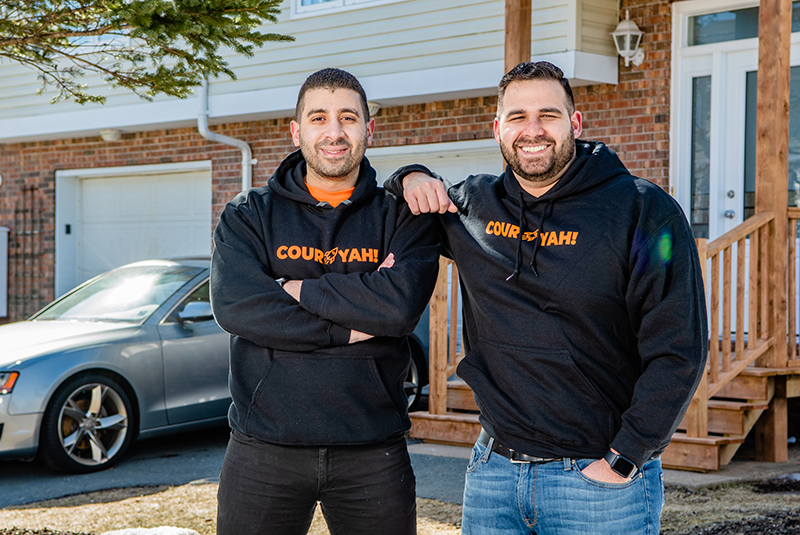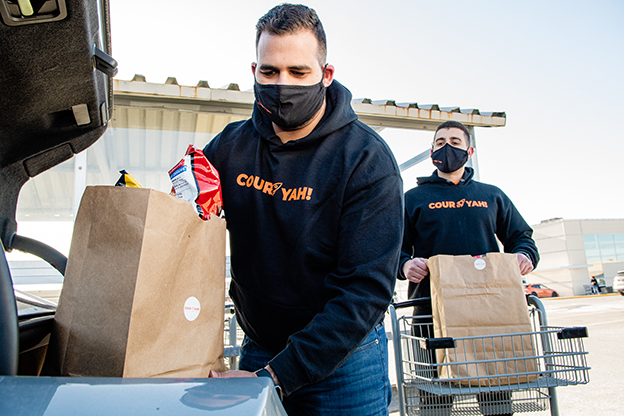ProductPayPalPerformanceSocial ImpactResearch and Insights
Jim Magats, SVP Omni Payments
In honor of Immigrant Heritage Month, I’m highlighting Mohamed and Omar Soliman, the owners of Couryah, an immigrant-owned, Halifax, Nova Scotia-based grocery delivery service. Omar and Mohamed had to quickly scale their business to meet the surge in demand for grocery delivery services during the pandemic, all while continuing to manage operations, customer service, marketing and more.
The brothers’ entrepreneurial spirit is passed down from their father, who left a stable job in Egypt in the early 2000s to emigrate to Canada in order to create a better future for his family. I recently had the opportunity to catch up with the brothers to hear more about how their father inspired them to start their business, how they’ve managed their business during a period of rapid growth, and their advice for other entrepreneurs. I’m excited to share our conversation here.
Jim Magats: Can you share a bit about Couryah and how you started it?
Mohamed Soliman: My brother and I founded Couryah, an online delivery service, in 2019 after experiencing first-hand the gap in the market for a reliable grocery delivery service. Our goal was to build a one stop, on-demand delivery platform for all food and grocery stores in the city. I worked as a cab driver, on and off, for eight years while finishing my engineering degree before we founded Couryah and spent a lot of time in the taxi reading books and listening to podcasts about how to start and run a business. In 2019, we realized the market was ready and we founded Couryah.

The name Couryah is a made-up word inspired by the excitement when you see your courier arrive with your order – “Cour-Yah!” It is derived from the French pronunciation of courrier. At the time, we were looking for one word that is easy to remember and can still be associated with delivery.
Omar Soliman: A lot of hard work, late nights and learning on the go went into getting our business off the ground. When we first started, we were bootstrapping everything. We used our parents’ basement as a home office. We were doing deliveries, customer support and marketing by ourselves. We also actively listened to our customers’ feedback to see what we could do better, where people wanted us to deliver and what products they wanted to buy. That really helped us build a product and service that our customers love.
JM: The pandemic caused many shoppers to pivot to grocery delivery. How has this trend impacted your business?
MS: The pandemic dramatically accelerated our growth. We went from planning and iterating on our products to suddenly needing to focus on operations. Our business was delivering essentials, anything you could find in a grocery store, and on-demand delivery became the service that most improved people’s lives during the pandemic. Suddenly, all of our delivery spots were selling out days in advance. We went from taking orders, shopping for groceries and delivering the goods by ourselves to hiring 34 employees and doing over half a million dollars in grocery revenue, compared to $20,000 in 2019, by the end of 2020. In the first few months of the pandemic, our revenue grew by 10X.
JM: You’ve clearly seen a lot of success this past year. What lessons have you learned about running a business as a result of the pandemic and how will you apply those learnings moving forward?
OS: I still remember when Nova Scotia announced the first lockdown. We were in a grocery store, shopping for our customers, and all of a sudden we started getting pings from customers placing new orders. There was quickly a huge surge in demand for our services. We were thrown in the deep end and had to learn a lot about running and scaling a business on the fly.
We quickly learned the importance of listening to our customers and enabling seamless experiences. Based on customer feedback, we’ve been working to better define the shopping process -- from giving customers the opportunity to request a refund or cancel their order if a specific item isn’t available in store, to providing complete transparency throughout the whole process. Our team is also building a complete app interface – a customer app, partner app and shopper app. We currently operate only as a website, so we’re excited about this transition and how it will be able to offer a better experience for our customers and partners, especially as consumers are moving to mobile. And speaking of customer experience, it’s one of the reasons we decided to enable PayPal on our website.
JM: Can you speak a bit more about how PayPal has helped your business?
MS: PayPal has been a lifesaver for us. It’s one of those names you see everywhere. It makes people feel comfortable with their shopping experience because it’s both seamless and secure. When we started our business, a lot of people didn’t know the Couryah brand. They’d see our ads on social media, but didn’t really know if our business was real or not. People would go on our website and see that we accept PayPal, so that helped customers feel like they could trust our platform.
OS: PayPal has also been great from the business owner side. Today, 20 percent of our revenue comes through PayPal. It’s an incredibly important part of our business. Not just for payments, but also for managing the business with things like PayPal invoicing. With PayPal’s invoicing solution, we can send our customers payment reminders with customized messages to collect payment or pay off a specific invoice directly through the PayPal dashboard. At the start of the pandemic, PayPal was a lifesaver as the company waived their fees and provided real-time money transfers* to help business owners survive a very difficult time.
JM: Your father has been an important role model for you, both in business and in life. Can you share more about how he has set an example for you?

OS: Our father is a very hardworking man who is devoted to his family. He ended up leaving a high-paying, full-time job in Egypt to move to Canada and give us the opportunity for a better education and quality of life. He burned through most of his savings to get us to where we are. As kids, we would see him put himself into any job out there. He would work 12 hours a day, six to seven days a week just to make ends-meet, and he instilled in us a sense of perseverance.
MS: We wouldn’t be where we are today without his sacrifices. He is a very humble man who believes that working an honest job and providing for your family is all that really matters. As an entrepreneur, when you start a business, there are a lot of things that can go wrong. You need to be mentally tough to persevere, and watching our father has been the best prep for us.
JM: Do you have any advice for other people looking to start their own business?
OS: Start. Write your ideas down. Create a logo, write down brand names you like, incorporate that name and talk to potential customers. If you start with a perfect product then you’re starting too late. Put in the work. It’s not going to be easy, but it will be so worth it once you see the end result.
MS: And don’t forget to talk to your customers. A continuous feedback cycle will help you build your business. Also, don’t be afraid to make mistakes. There’s no way you can avoid them, but you can learn from them. If you’re too scared to make mistakes, it will be tough to get your business off the ground. Finally, don’t pay attention to any of your self-doubts. You need to step on those doubts and keep pushing forward.
We’ll be publishing another interview with an inspiring PayPal small business owner next month, so be sure to check back in.
*This campaign ended 4/30/2020 and is not currently available.